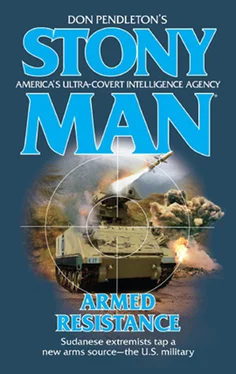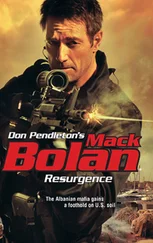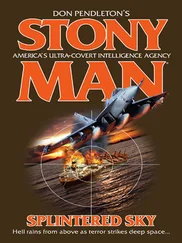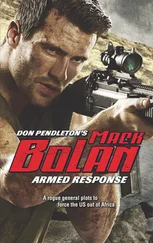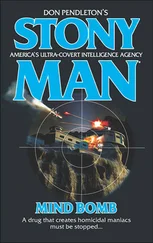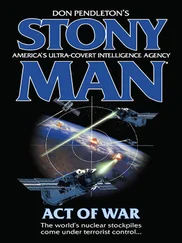STONY MAN
When the Oval Office needs covert rapid response to avert disaster, Stony Man gets the call. Handpicked, the best of the best in cyber-intelligence and commando warfare, this elite squad fights by a code of duty and dedication to holding the line between the free world and violent extremists.
ARMED RESISTANCE
Sudan’s political situation is a nightmare. Guerilla forces specializing in human trafficking and black market arms rule in the violence-torn region. With members undercover inside a military arms depot in Mississippi, weapons are being diverted to the rebels profiteering on human misery. Able Team moves in stateside, while Phoenix Force goes deep into the bloodiest regions of Sudan and Uganda. It’s a grim race to find a kidnapped CIA agent, a cache of human cargo and an arsenal of stolen weapons bound for illegal sale. Stony Man is hunting predators who kill for profit and pleasure—battling long odds to bring some justice to a ruthless land.
“There’s trouble!”
Manning’s eyes flicked to the rearview mirror.
James turned to glance through the back window and spotted the dim points of headlights. A jeep appeared to be closing on them fast. It could only mean police. In other countries they might have stopped, but this time they had to consider the Sudanese police on the opposite side of the fence. A good number of those in uniform were little more than thugs, and out here the Phoenix Force warriors couldn’t consider them soldiers on the same side. They would avoid a conflict if at all possible but not at the risk of failing in their mission. Lester Bukatem and his LRA guerillas were a threat that had to be dealt with, and neither Manning nor James would let police officials detain them, friendly or otherwise. Chances were good this meeting would result in their arrest and possible confinement without cause.
“If we stop, we’re dead,” James said.
“Then I won’t stop.”
Armed Resistance
Stony Man
Don Pendleton

www.mirabooks.co.uk
Special thanks and acknowledgment to Jon Guenther for his contribution to this work.
Contents
CHAPTER ONE
CHAPTER TWO
CHAPTER THREE
CHAPTER FOUR
CHAPTER FIVE
CHAPTER SIX
CHAPTER SEVEN
CHAPTER EIGHT
CHAPTER NINE
CHAPTER TEN
CHAPTER ELEVEN
CHAPTER TWELVE
CHAPTER THIRTEEN
CHAPTER FOURTEEN
CHAPTER FIFTEEN
CHAPTER SIXTEEN
CHAPTER SEVENTEEN
CHAPTER EIGHTEEN
CHAPTER NINETEEN
CHAPTER TWENTY
CHAPTER TWENTY-ONE
CHAPTER TWENTY-TWO
CHAPTER TWENTY-THREE
CHAPTER TWENTY-FOUR
CHAPTER TWENTY-FIVE
EPILOGUE
CHAPTER ONE
South Sudan
Two hundred miles north of the border with Uganda a biting wind swept across the desert, wending its way through the rock formations and echoing like howling spirits.
No matter how much time Samir Taha spent in this environment he never really became accustomed to it. Even after six years spent fighting in the barren and rugged terrain of his homeland, the legends still gnawed at his spirit. For Taha and his men, the wind carried the souls of those who had gone before and fought for liberty and freedom for those in South Sudan.
“You hear them again?” a voice whispered.
“I hear them often,” Taha replied, although he didn’t look at the man who spoke. He need not look his brother in the eye. Kumar knew better than anyone else the things that troubled him.
“You know I do not believe in the spirits,” Kumar said.
“I have never asked you to believe in them, merely respect those of us who do.”
“But to what ends?”
“I do not wish to discuss this here and now,” Samir said, waving his brother to silence. “Now be still.”
Satisfied there would be no further outbursts from his young and rather impetuous sibling, Samir Taha returned his attention to the camp ahead. Their intelligence had always been good in the past where it concerned those godless bastards who chose to traffic in innocent women and children. It had been difficult to gain support from government officials. Taha wished he could have recruited more men from their own ranks for this mission but General Kiir had refused to provide them. They were a ragtag bunch, to be sure, undisciplined and poorly equipped. Only half of the assault rifles they carried, Kalashnikov variants, were even capable of full auto fire.
A good number of them were semiautomatics—7.62 mm SKS-style rifles smuggled from connections in China or American-made AR-15s chambered to fire .223 cartridges. The remaining soldiers carried pistols and knives, and the ammunition situation was plain abysmal.
Taha had even begged the general to part with a couple of AK-47s but the old man wouldn’t hear of it.
“We have no reason to believe your intelligence is good,” General Kiir had told him. “If you do this then you do it voluntarily. I cannot risk it as a sanctioned mission.”
The general’s lack of support infuriated Taha but there wasn’t much he could do about it. Although many of the men among them, particularly those who reported directly to Taha, their platoon commander, agreed with Taha, the majority of them didn’t want to cross Kiir. Even among the brave fighters of the Sudan People’s Liberation Army, who were fighting for independence from North Sudan, there were those who still bartered for position by politicking. Taha had no use for such men and he knew who they were. He had flatly refused some of those who had volunteered to accompany him on his mission, knowing where their loyalties truly lay.
Up ahead, Taha saw the cook fires of his enemy and smelled the roasted meat on which they gorged themselves. Probably most of their food had been stolen from the village they had razed early the previous morning. Most of the men in the village had been slaughtered, their bodies covered with flies and some of their hands—detached by explosives or the heavy rounds of .50-caliber machine guns—mutilated as food for wild dogs and hungry cats. It hadn’t taken any imagination for Taha to conclude it was the work of the Lord’s Resistance Army.
The very name was vile and brought a sour taste to Taha’s mouth every time he thought of it. These men, barbarians whom Taha would not even acknowledge as fellow countrymen, had known their way in this region long enough. If the authorities in the cities and the members of the Sudanese Armed Forces, representing North Sudan, would not lift a finger to protect innocent Sudanese, then Taha would do whatever he could to fight for those incapable of defending themselves. It was what good men did—it was what Christian men did.
“Prepare to sound the signal,” Taha ordered his brother.
Kumar said nothing in response; they had practiced this many times and he knew what to do.
In one respect, God had been shining his blessings upon them since the wind would mask their approach. The Lord’s Resistance Army would not expect them in the least; their leaders knew of the SPLA’s desire to avoid conflict whenever possible. When the fighting grew too bad, that’s when the government got involved and sent in armed forces that were well-equipped and well-trained. But those military units were not discerning and their orders were to kill any official combatants irrespective of creed. Somehow, and Taha had never been able to understand it, many more of the men in the Sudan People’s Liberation Army had fallen victim to the genocidal policies of the Sudanese Armed Forces than those of the Lord’s Resistance Army. It was more than numbers, more than coincidence.
No matter, because Taha no longer feared what another man could do to him—he only feared looking into the eyes of his God and being condemned to eternal hell because of cowardice. He was accountable for the blood of his brothers and he did not want that accounting to be one of shame. So he would bear whatever burdens were laid upon his shoulders in this time and place.
Читать дальше
